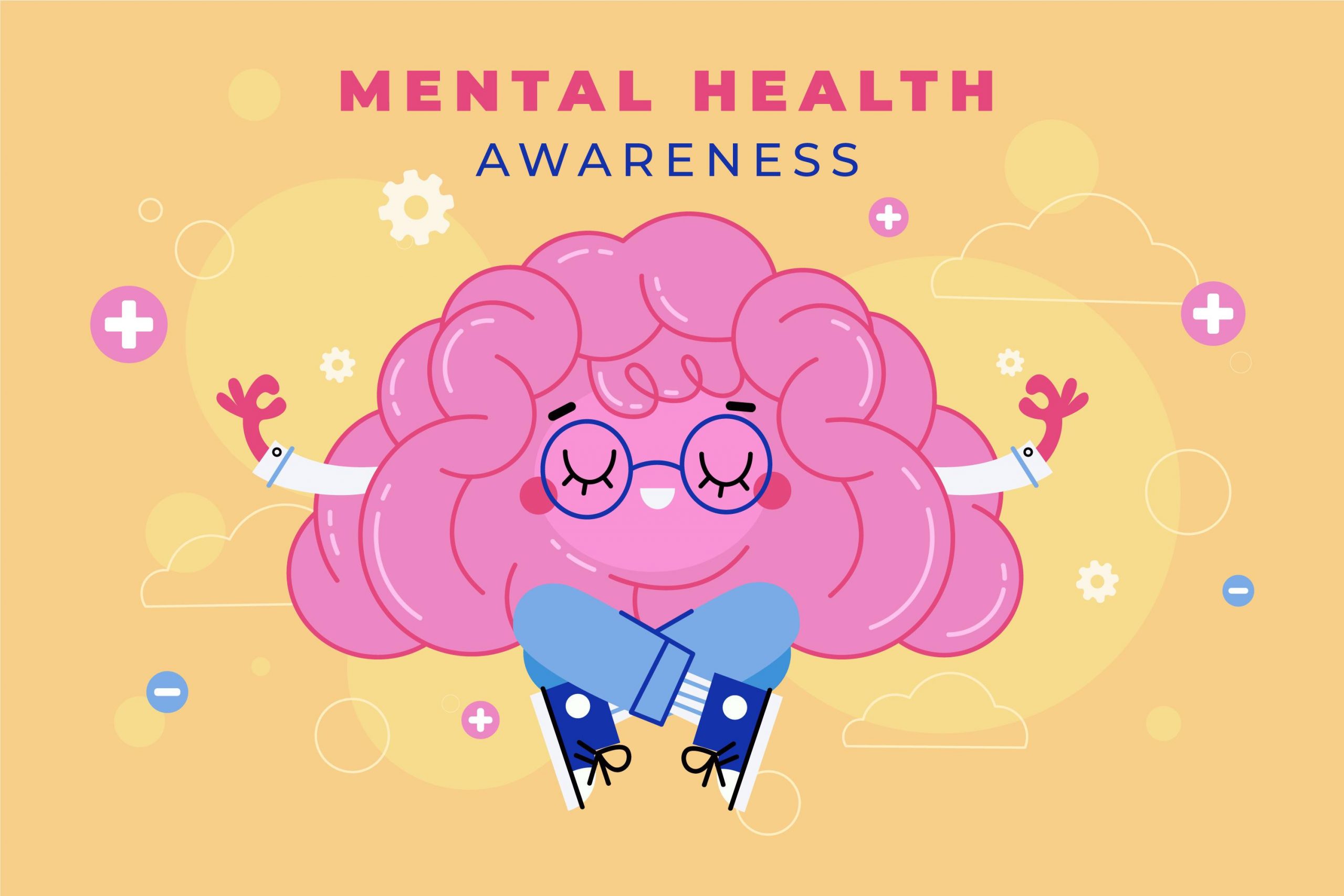What is Mental Health ? And how it can be improved ?

What Is Mental Health :
Our emotional, psychological, and social well-being are all parts of our mental health. It has an effect on the way we think, feel, and act. It also affects how we deal with stress, interact with others, and make decisions. Mental health is vital at all stages of life, including childhood, adolescence, and maturity.
If you have mental health difficulties, your thinking, mood, and behavior may be affected over the course of your life. Many factors play a role in mental illness, including:
- Genes and brain chemistry are types of biological factors.
- Trauma or abuse
- Mental health issues run in the family
Early Signs:
There is no reliable physical test or scan that can determine mental disorders. However, the following are probable indications of a mental health condition that people should be aware of:
- Avoiding contact with friends, family, and coworkers
- They are avoiding activities that they would otherwise like.
- Too much or too little sleep
- Too much or too little food
- Feeling sad
- Having low energy levels on a regular basis
- Using mood-altering substances such as alcohol and nicotine on a more regular basis
- Expressing negative feelings
- Being confused
- Being unable to perform daily duties such as getting to work or preparing a meal.
- Persistent thoughts or memories that reoccur on a frequent basis
- Considering harming yourself or others physically
- hearing voices
- having delusions
Common Mental Health Disorder
Mental illness, also known as a mental health disorder, refers to a wide range of mental health conditions—disorders that affect your mood, thinking, and behavior. Examples of mental illnesses include depression, anxiety, schizophrenia, eating disorders, and addictive behaviors.
Many people have mental health problems from time to time. However, when persistent signs and symptoms cause frequent stress and affect your ability to work, mental health problems can become mental illnesses. helpful link https://www.womenio.com/38210/how-mental-health-affects-relationships
1. Anxiety:
Anxiety disorders are the most frequent type of mental illness. According to the Anxiety and Depression Association of America, People who suffer from these disorders experience intense fear or anxiety in response to specific objects or situations. The majority of people who suffer from anxiety disorders will strive to avoid whatever it is that makes them anxious.
Anxiety disorders include the following:
Generalized anxiety disorder (GAD):
GAD is defined by the American Psychiatric Association as excessive worry that interferes with daily life.
Physical symptoms, such as restlessness, may also be present.
1. Fatigue
2. Muscular contractions
3. Sleep deprivation
In patients with GAD, an episode of anxiety symptoms does not always require a specific trigger. They may have extreme anxiety when confronted with mundane tasks that do not pose a direct threat. Such as doing chores or making appointments. A person with GAD may feel anxious without any apparent cause.
Panic disorders:
People with a panic disorder experience regular panic attacks, which involve sudden, overwhelming terror or a sense of imminent disaster and death.
Phobias:
There are various kinds of phobias:
- Simple phobias are an exaggerated dread of certain objects, scenarios, or animals. A common example is the fear of spiders. Here’s where you can learn more about simple phobias.
- Social phobia is a fear of being judged by others. It is sometimes referred to as social anxiety. People who suffer from social phobia frequently limit their exposure to social situations.
- Agoraphobia is the fear of being trapped in a position where getting out is difficult, such as an elevator or a moving train. Many individuals mistake this phobia for a fear of the outdoors. Here’s all you need to know about agoraphobia.
Phobias are quite personal, and doctors aren’t familiar with all of them. There could be thousands of phobias, and what one person considers strange may be a serious condition that consumes their everyday lives for another.
Obsessive-compulsive disorder (OCD) is a type of obsessive-compel (OCD).
Obsessions and compulsions are common among people with OCD. In other words. They have a strong need to conduct repetitive actions, such as hand washing, and they have persistent, anxious thoughts.
2. Depression :
Depression (major depressive disorder) is a widespread and significant medical condition that has a negative impact on how you feel, think, and behave. It is also, thankfully, treatable. Depression produces unhappiness and/or a loss of interest in previously appreciated activities. It can cause plenty of mental and physical issues, as well as a reduction in your capacity to operate at work and at home.
Symptoms of depression can vary from moderate to severe, and include:
- Sadness
- Loss of interest or pleasure in previously enjoyed activities
- Appetite changes – weight loss or increase that isn’t connected to dieting
- Sleeping problems or sleeping too much
- Increased fatigue or a loss of energy
- Increased involuntary physical activity (e.g., inability to sit still, pacing, and handwringing) or slower
- movements or speech (these actions must be severe enough to be observable by others)
- Feeling worthless or regretful
- Thinking, concentrating, or making decisions become difficult.
- Suicide or death thoughts
3. Schizophrenia:
Authorities in the field of mental health are still debating whether schizophrenia is a single sickness or a collection of illnesses. It’s a complicated situation.
According to the National Institute of Mental Health, schizophrenia symptoms usually appear between the ages of 16 and 30. The person’s ideas will appear fragmented, and they may find it difficult to assimilate information.
Schizophrenia manifests itself in both bad and good ways. Delusions, thinking disorders, and hallucinations are all positive indications. Withdrawal, a lack of motivation, and a flat or unsuitable mood are all negative effects.
Treatments:
There are several approaches to dealing with mental health issues. Treatment is very personalized, and what works for one person may not work for the next. The following are some examples of treatments.
Psychotherapy:
This method of treatment approaches mental illness from a psychological standpoint. Examples include cognitive behavioral therapy, exposure treatment, and dialectical behavior therapy.
This sort of treatment is provided by psychiatrists, psychologists, psychotherapists. Some primary care providers. It can assist patients in recognizing the source of their mental illness. Beginning to develop more healthy thought patterns that support daily living while reducing the danger of isolation and self-harm.
Medication
Some people take prescribed medications, such as antidepressants, antipsychotics, and anxiolytic drugs.
While these medications cannot cure mental diseases, they can help a person improve their symptoms and resume social contact and a normal schedule while they work on their mental health.
Some of these drugs act by increasing the body’s absorption of feel-good chemicals from the brain, such as serotonin. Other medications either increase the total levels of these compounds or stop them from degrading or being destroyed.
Self-Help
A person dealing with mental health issues will almost always need to make lifestyle modifications in order to be well. Reducing alcohol consumption, sleeping more, and eating well-balanced. Healthy diets are examples of such adjustments. People may need to take time from work or handle personal relationship issues that are negatively impacting their mental health.
Relaxation techniques:
Such as deep breathing, meditation, and mindfulness may be beneficial to people suffering from anxiety or depression. Work that you enjoy and that has importance for you and others. Whether or not you are paid, engage in tasks that challenge your creativity and make you feel productive. Gardening, sketching, writing, playing an instrument, or making something in your workshop are all good options.
Relationships:
Spending quality time with people who matter to you, whether they’re friends, grandkids, or older relatives. They can benefit your health as well as theirs, while also giving you a feeling of purpose.
Taking care of a pet:
Caring for a pet is a duty, but it also makes you feel needed and appreciated. There is no affection quite like the unconditional love that a pet can provide.
Volunteering:
Giving others or the community meaning and purpose can improve your life and make you happier. There is no end to the number of individual and group volunteer options available to you. Volunteers are essential to the survival of schools, churches, NGOs, and humanitarian groups of all kinds.
Caregiving:
Taking care of a parent, a spouse, or a child is a kind and devoted deed that may be as rewarding as it is stressful.



